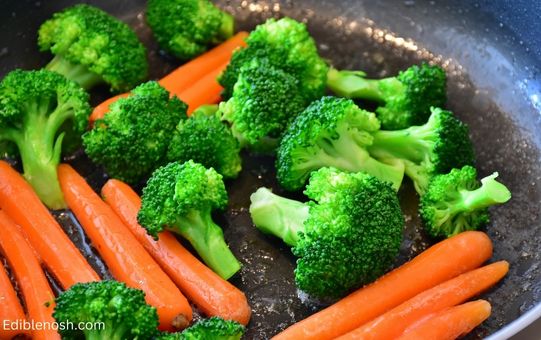Carrot skins are typically discarded, but did you know that they are rich in fiber, vitamin C, and antioxidants? So, are carrot skins good for you?
Carrots skins are a perfect source of fiber, antioxidants, and vitamin C, which provide potential health benefits including weight loss, digestion, and enhanced skin health. However, it is also important to consider potential risks such as the presence of pesticides or the possibility of the bitter taste.
This article will examine the potential health benefits and risks of eating carrot skins. Let’s find out!
Contents
Why Carrots Skin Good for You Matter?
Carrot skins are the outer layer of the carrot, and they contain a variety of nutrients that can be beneficial for our health. One of the main nutrients found in carrot skins is fiber, which is an important nutrient that helps to keep our digestive system healthy and can also help to lower cholesterol levels.
Carrot skins are also a good source of vitamin C, which is a powerful antioxidant that helps to boost the immune system and protect against cell damage. Additionally, carrot skins contain antioxidants, which are substances that help to protect our cells from damage caused by free radicals.
Incorporating carrot skins into your diet can offer a variety of potential health benefits, such as improved digestion, weight loss, and improved skin health.
However, it’s important to consider any potential risks as well, such as the presence of pesticides or the possibility of a bitter taste.
If you’re not a fan of the taste or texture of carrot skins, you may prefer to peel your carrots before eating them. Ultimately, whether or not carrot skins are good for you will depend on your individual preferences and needs.
Read Also: Are Baby Carrots Bad For You?
Nutritional Value of Carrot Skins
First and foremost, it’s important to consider the nutritional value of carrot skins. Carrot skins contain a variety of nutrients, including fiber, vitamin C, and antioxidants.
- Fiber: Carrot skins are a good source of fiber, with about 1 gram of fiber per medium carrot. Fiber is an important nutrient that helps to keep our digestive system healthy and can also help to lower cholesterol levels.
- Vitamin C: Carrot skins are also a good source of vitamin C, with about 5 milligrams per medium carrot. Vitamin C is a powerful antioxidant that helps to boost the immune system and protect against cell damage.
- Antioxidants: Carrot skins contain antioxidants, which are substances that help to protect our cells from damage caused by free radicals. Free radicals are unstable molecules that can damage our cells and contribute to the development of chronic diseases such as cancer and heart disease. Antioxidants help to neutralize these free radicals and protect our cells.

Benefits of Eating Carrot Skins
Eating carrot skins may offer a number of potential health benefits. For one, the fiber in carrot skins can help to improve digestion and prevent constipation.
It can also help to reduce the risk of developing certain digestive disorders, such as inflammatory bowel disease and diverticulitis.
The vitamin A in carrot skins is important for maintaining healthy vision, and the antioxidants found in carrot skins may help to protect against chronic diseases.
Drawbacks of Eating Carrot Skins
While carrot skins do have some benefits, there are also some potential drawbacks to consider.
One concern is that carrot skins may contain pesticides and other chemicals, especially if they are not organic. These chemicals can be harmful to your health if consumed in large amounts.
Additionally, carrot skins can be difficult to digest for some people, especially those with digestive issues such as inflammatory bowel disease or irritable bowel syndrome.
How to Incorporate Carrot Skins into Your Diet?
If you’re interested in incorporating carrot skins into your diet, there are a few different ways you can do so:
- Eat Them Raw: One option is to simply eat carrot skins raw, either as a snack or as part of a salad. Just be sure to wash them thoroughly first.
- Cook Them: Another option is to cook carrot skins and incorporate them into your meals. You can chop them up and add them to soups, stews, and roasted vegetables. Just be sure to cook them well to make them easier to digest.
- Make Carrot Skin Chips: If you’re a fan of crispy snacks, you can try making carrot skin chips. Simply wash and slice the skins into thin strips, toss them in a bit of oil and your favorite seasonings, and bake in the oven until crispy.
- Add Them to Smoothies: If you’re not a fan of the texture of carrot skins, you can try adding them to smoothies. Just be sure to blend them well so that they don’t affect the texture of your smoothie.
Read Also: Are Carrots With Hummus Healthy?
Conclusion
Carrot skins can be a healthy addition to your diet, as they are rich in fiber, vitamin A, and antioxidants.
However, it is important to consider the potential drawbacks, such as the potential presence of pesticides and the potential difficulty in digesting carrot skins.
If you do decide to include carrot skins in your diet, it is best to choose organic carrots to minimize the risk of consuming harmful chemicals.
FAQs | Are Carrot Skins Good for You?
Here are five FAQs related to are carrots skins good for you?:
Are Carrot Skins Good For You?
Carrot skins can be good for you because they contain fiber, vitamin C, and antioxidants. These nutrients can help to boost your overall health and protect against chronic diseases.
However, it’s important to consider any potential risks, such as the presence of pesticides or the possibility of a bitter taste.
Do Carrot Skins Have Any Health Benefits?
Carrot skins contain fiber, vitamin C, and antioxidants, which can offer a variety of health benefits.
Fiber can help to improve digestion and lower cholesterol levels, vitamin C can boost the immune system and protect against cell damage, and antioxidants can protect against free radicals and reduce the risk of chronic diseases.
Is It Okay To Eat Carrot Skins?
It is generally safe to eat carrot skins, as long as you wash them thoroughly and cook them well if necessary. However, if you are concerned about pesticides or if you find the taste or texture unpleasant, you may prefer to peel your carrots before eating them.
How Can I Incorporate Carrot Skins Into My Diet?
There are a few different ways you can incorporate carrot skins into your diet: eating them raw, cooking them, making carrot skin chips, or adding them to smoothies. Just be sure to wash them thoroughly and cook them well if necessary.
Are Carrot Skins High In Nutrients?
Carrot skins are a good source of fiber, vitamin C, and antioxidants, which makes them a relatively nutrient-dense food.
However, it’s important to consider the overall nutrient content of your diet and to consume a variety of foods to ensure that you are getting all of the nutrients you need.

